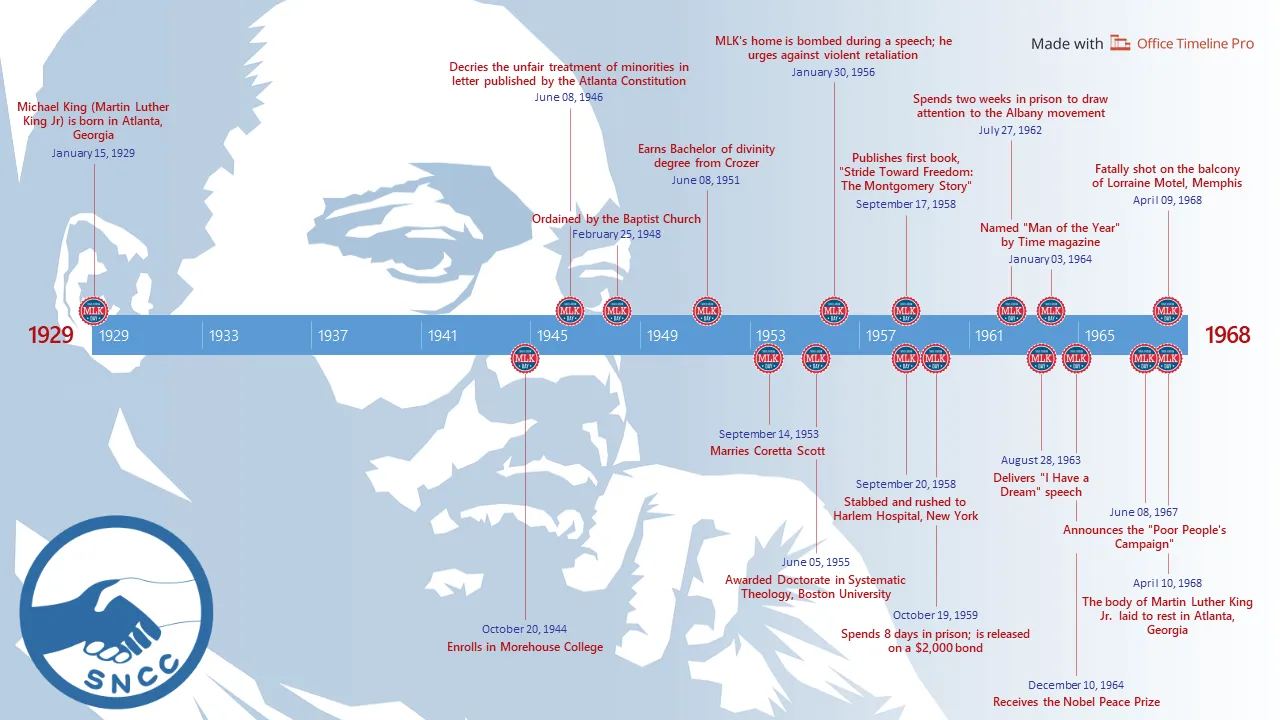Martin Luther King timeline
Commemorate Martin Luther King's legacy! Explore our timeline which highlights pivotal moments in the life of the civil rights leader. Join us in honoring his contributions to equality and justice.

The third Monday of January each year is dedicated to Martin Luther King, one of the greatest thought leaders of the twentieth century. Officially declared a federal holiday back in 1983 by former President Ronald Reagan, the origins of Martin Luther King Day can be traced back to 1971 when the city of St. Louis, Missouri and others started honoring the great thinker and orator with annual celebrations. However, it wasn’t until January 17, 2000, that all 50 states aligned their policy and formally recognized this holiday. Arizona, New Hampshire and Utah were the last states to follow suit. To pay tribute to this special day, we have created the Martin Luther King timeline, which highlights the most significant moments in the life and work of the civil rights leader.
Without a doubt one of the most controversial historical figures, Dr. King forged a strong legacy in the unrelenting battle against social inequity, racial discrimination and segregation. He did not believe that violence could ever represent the answer, regardless of the question. In that sense, Martin Luther King was a firm detractor of the Vietnam war, stating: “The past is prophetic in that it asserts loudly that wars are poor chisels for carving out peaceful tomorrows.”. It is important to remember that his teachings came during an incredibly tense socio-economic context where minorities were generally viewed as second-class citizens and abuse against them was commonplace.
A highly educated advocate of the downtrodden, King earns his Bachelor’s degree in Sociology from Moorhouse College, Atlanta in June 1948 and a Doctorate in Systematic Theology from Boston University in June 1955. Concurrently, he is awarded a Bachelor of Divinity Degree by the Crozer Theological Seminary and delivers a compelling valedictorian speech, one of many to come. According to scholar and his own accounts, his work was heavily influenced by both religious and non-religious figures like Mahatma Gandhi, Henry David Thoreau, Jesus and Abraham Lincoln. It’s worth noting, at the same time, that King was not a supporter of biblical literalism, in that he believed we should view the Bible as moralizing mythological literature rather than a historical account of miraculous occurrences. Nonetheless, he was an ordained minister and has led the Southern Christian Leadership Conference (SCLC) group from its founding in 1957 until his passing.
Martin Luther King’s merits have been recognized by the greatest minds of his generation: he became the youngest recipient of the most prestigious award, the Nobel Peace Prize, in 1964. Dr. King took this opportunity to announce his intention to donate “every penny” that came with this distinction towards the support of civil rights movements. The honor was awarded to King one year following the famous “I Have a Dream” discourse held in front of a crowd of over 250,000 participants at the Lincoln Memorial. Perhaps slightly less spectacular but still a highly impressive distinction, Time Magazine named him “Man of the Year” and placed him on the cover.
Dr. King believed in affirmative action rather than empty rhetoric. In his words: “Human progress is neither automatic nor inevitable… Every step toward the goal of justice requires sacrifice, suffering, and struggle; the tireless exertions and passionate concern of dedicated individuals.” Nonetheless, while earning him hundreds of thousands of loyal supporters, thanks to his tireless efforts towards building a society where all men are treated equally, he made numerous enemies along the way. The list includes prominent figures of the day, such as J. Edgar Hoover who spearheaded the FBI’s smear campaign against him and formulated the accusations of sympathizing with the communists; King was adamant in denying the allegations. His untimely demise is still shrouded in mystery, but it is widely believed that Martin Luther King’s socio-political activism is what led to his assassination at the hands of James Earl Ray, a well-known racist and small-time criminal offender.
Even though he was only 39 when his life was tragically cut short, the legacy of MLK is as valuable and thought-provoking today as it was in the 50s and 60s because it challenges the audience to think carefully about the society they want to leave behind for future generations.
The Martin Luther King Timeline was built using the Office Timeline PowerPoint add-in, a powerful yet simple to use project management tool capable of rendering attractive visual representations of your data in no time. Try out the free version or explore the tool's 14-day free trial of the most advanced edition, which comes with extra features for those who need more complex applications. You can download the MLK timeline as a PowerPoint file and add any key moments that you believe we may have missed. Happy Martin Luther King Day!
Project management tips and tricks
Turn project data into professional timelines
Get the advanced features of Office Timeline free for 14 days.


